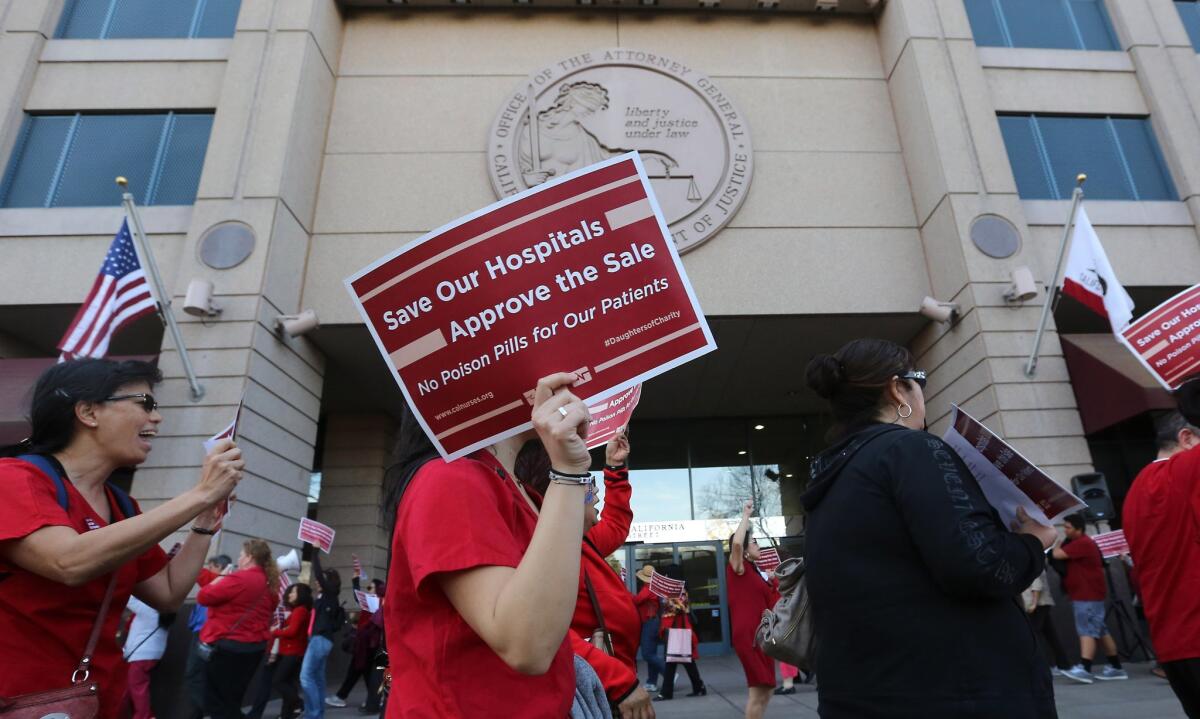Opinion: Kamala Harris’ conditional love for Prime Healthcare Services

- Share via
In approving the sale of six cash-straped Daughters of Charity hospitals to Prime Healthcare Services of Ontario, California Atty. Gen. Kamala Harris took pains to guard against Prime reducing the types of care available or shifting the focus away from the low-income and elderly patients that make up the bulk of their current patients.
These steps included unprecedented requirements to keep most of the hospitals open with their major services intact for at least 10 years, twice as long as Prime had pledged.
The question now for Prime is whether it can do those things without winding up in the same financial mess that forced the Daughters to look for a buyer.
The Daughters operate St. Francis and St. Vincent medical centers in Los Angeles County, along with four other hospitals in the Bay Area. Losing money at a rate of about $10 million a month, the chain put itself up for bid last year before deeming only one suitor, Prime, capable of keeping all six hospitals open and assuming all its debts (including its large pension liabilities).
State law requires the attorney general to consent to any proposal to shift control of a non-profit hospital to a for-profit entity. Numerous Democratic officials and the influential Service Employees International Union urged Harris to reject the deal, with the SEIU lining up behind a bidder the Daughters had rejected: Blue Wolf Capital, a private equity firm in New York.
Prime, which operates 30 hospitals around the country, specializes in turning around failing ones. But its opponents argue that the company has a record of gouging insurers and customers through high charges for out-of-network services, exotic diagnoses and unnecessary admissions -- accusations that Prime denies.
In her decision, which was released late Friday afternoon, Harris placed numerous conditions on Prime that aim to prevent those sorts of techniques. For example, it bars Prime from canceling its contracts with Medi-Cal managed-care plans for 10 years, and its contracts with county health departments for five to 10 years. It also requires Prime to bring its debt-collection practices into compliance with state and federal law.
Beyond that, Harris would require Prime to continue essential healthcare services, including a long list of acute-care services, at St. Francis and three Bay Area hospitals for 10 years, and for five years at St. Vincent. The hospitals would be required to provide abortion and other reproductive health services that the Daughters of Charity would not. And Prime would have to continue caring for indigent patients and providing similar community benefits at the same level that Daughters has.
The conditions give Prime the opportunity to demonstrate that it can turn around failing hospitals without resorting to the hardball tactics of its early years -- for example, by increasing efficiency, improving the quality of care, attracting more insured patients and negotiating better reimbursement rates from their insurers than Daughters could.
Prime’s initial response, though, wasn’t enthusiastic.
“The conditions imposed on this sale by the attorney general are extensive and many are unprecedented, including maintaining four hospitals as acute care hospitals and a fifth as a skilled nursing facility for a minimum of 10 years,” the company said in a statement. “Prime Healthcare, with [Daughters of Charity], will need to evaluate the viability and future stability of the ... hospitals under these conditions.”
Prime said it and Daughters “remain committed to ensuring a future for these hospitals that will allow them to continue their legacy of service and deliver the highest quality of compassionate care to their communities.” But the company notably did not commit to going ahead with the purchase under the conditions Harris imposed.
A state official familiar with the deal, who spoke on condition of anonymity because he was not authorized to speak publicly, said Harris based many of her recommendations on the reports from the independent expert her office hired to analyze the deal. Another major factor was the concerns expressed by the public about the potential loss of crucial healthcare services in their communities.
Harris’ office believes Prime is capable of keeping the six hospitals open under the conditions she ordered, based on all the information it gathered about Prime, the official said, adding that whether the company goes ahead with the deal is entirely up to Prime.
By Daughters’ estimation, Prime is the only real hope left for its hospitals. Blue Wolf was proposing just to manage them, not to buy them. If Harris really wants the hospitals to stay open, it would defeat the purpose to impose conditions that lead Prime to walk away, as would-be partner Ascension Health did in September 2013.
Conway Collis, president of Grace, a nonprofit anti-poverty group sponsored by the Daughters of Charity, said he didn’t think Harris was trying to scuttle the deal.
“Both the attorney general and Prime have done and are doing the right thing,” Collis said. “She was holding their feet to the fire. She’s had a lot of concerns about them.... They’re very tough conditions, but I think she was making judgments about what she really thought was necessary.”
Nevertheless, Collis said the 10-year requirements were extraordinary. “Prime really does have to look at [Harris’ conditions] in terms of, ‘Is this do-able?’ These hospitals have been losing money on the order of $100 million a year.”
Follow Healey’s intermittent Twitter feed: @jcahealey
More to Read
A cure for the common opinion
Get thought-provoking perspectives with our weekly newsletter.
You may occasionally receive promotional content from the Los Angeles Times.







